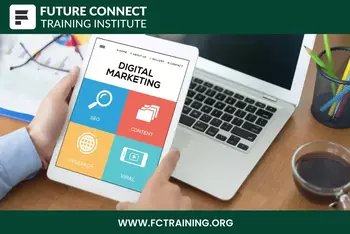Gateway Qualifications Level 2 Award in Digital and IT Skills
This unit provides learners with an understanding of the importance of digital skills in the workplace and how changes in employment have led to an increase in demand across a number of sectors. Learners will learn about the different types of job roles where digital skills are required, and the characteristics valued by employers to establish a successful career in today’s digital economy. Learners will also identify their own career/progression goals and plan how they will develop their digital skills to meet their intended goals.
Unit Learning Outcomes
Effects of digital technologies on employment:
- Reduction of employment in offices, as jobs have been replaced by computers and other digital devices in a number of fields (payroll workers, typing pools, car production workers)
- An increase in employment in other fields (website designers, computer programmers, data analysts, digital marketers, engineering design).
- Changing working patterns: remote working, part-time working, flexible hours, job sharing, compressed hours.
- Potential physical and psychological health risks: repetitive strain injury (RSI), back problems, eye problems, headaches, stress, fatigue, pain from poorly positioned equipment/and or bad posture, too much screen time/not being able to ‘switch-off’ from work.
Assessment Criteria
- 1.1 Explain the impact of digital technologies on employment.
Understand the digital skills and characteristics that are valued by employers.
- Industry specific: technical knowledge, working procedures and practices, etc.
- General: skills: communication, interpersonal skills, planning skills, organisational skills, time management, team working, numeric skills, creativity, problem solving, etc.
- Attitudes: determined, independent, integrity, tolerant, dependable, leadership, confidence, self-motivation, etc.
Assessment Criteria
- 2.1 Describe the different types of digital skills and characteristics that are valued by employers.
- Digital skills covers a broad range of roles across a number of sectors, for example, spreadsheet software is not only used by accountants and consultants, these skills are also essential to administrative, HR assistants and a number of other roles. Forklift/delivery drivers and warehouse workers also need digital skills as they need to know how to use inventory management systems.
Learners need to be aware that digital skills can be categorised in the following ways:
- Baseline digital skills - digital literacy skills that employers ask for in the vast majority of jobs across all sectors in the labour market include:spreadsheet and word processing tools such as Microsoft Excel and Microsoft Word, as well as enterprise management software like Oracle and SAP. These proficiencies are increasingly becoming a basic skill required for a majority of occupations.
- Digital/IT skills - competences in and/or knowledge of IT tools including computer programs and programming languages.
- Specific digital skills - digital skill requirements for more technically oriented jobs in areas such as customer relationship management (CRM) software, computer networking, digital media and design software, social media tools, and search engine analysis.
- Learners need to think about the different roles and sectors, such as the digital and creative industries where roles in software and programming, networking support or digital design are in demand, or the finance, marketing and machining and manufacturing industries where roles in data analysis, digital marketing and computer-aided design are required.
- Particular sector: for example, creative, IT, finance, machining and manufacturing, marketing etc
Assessment Criteria
- 3.1 Explain how digital technologies are used in different sectors and the digital skills associated with them.
- 3.2 Compare the digital skills required for two different job roles in a particular sector.
Learners should identify the characteristics and digital skills needed to meet their career/progression goals and include relevant SMART targets in a development plan with planned opportunities to indicate how/when they plan to develop their knowledge, skills and behaviours in reparation for employment, apprenticeship or further study.
Assessment Criteria
- 4.1 Summarise intended digital skills career/progression goals.
- 4.2 Produce a SMART plan to develop digital skills to meet intended career/progression goals.
FAQs
You will explore how digital technologies have led to both a decrease in some job roles (like payroll clerks) and an increase in others (such as website designers). You'll also learn about the changing patterns of work, like remote working, and the potential health risks associated with increased technology use, such as RSI and stress.
This qualification will cover a range of digital skills, from industry-specific technical knowledge to general skills like communication, teamwork, and problem-solving. You'll also learn about important personal attributes that employers look for, such as being determined, independent, and self-motivated.
A digital skills development plan is a structured way to identify the skills and characteristics you need for your desired career path and to plan how you will acquire them. You will create a SMART plan with specific, measurable, achievable, relevant, and time-bound goals to help you prepare for employment, an apprenticeship, or further study.
By understanding the impact of digital technologies on employment, identifying valuable digital skills and characteristics, and creating a personal development plan, this qualification will equip you with the knowledge and self-awareness needed to make informed career choices and proactively develop the skills that are in demand by employers in today's digital world.

This course includes:
- Creative Activities, Lectures and more
- Masters level Course Content with Hands-on Training
- Multiple Projects to test your skills upon
- Join the leading Industry with over 20 billion Pounds of investment
- Online Practical Training
- Flexible Payment Structure
- CV Support







